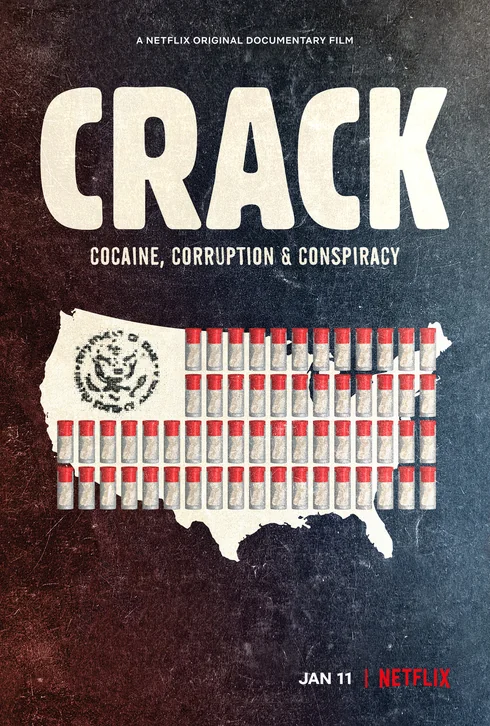🎯 Quick Overview
Trailer
- Director: Stanley Nelson
- Genre: Documentary, Crime, History
- Release year: 2021
- Runtime (length): 1h 29min
- IMDb rating: 6.7/10 (5.5K votes)
- Rotten Tomatoes: 100%
😅 Plot Summary – Badly Explained
A tiny rock makes everyone go wild and ruin their lives, and then we spend 90 minutes trying to figure out if the government was secretly cheering it on while folks argue if it’s personal choices or just bad vibes from the system.
🍿 Crack: Cocaine, Corruption & Conspiracy: Detailed Plot Synopsis
The Emergence of the Crack Epidemic
The documentary traces the origins of crack cocaine in the early 1980s, detailing how it emerged as a cheap, potent alternative to powder cocaine. It quickly flooded urban areas across America, transforming the landscape of inner-city communities. Through archival footage and personal testimonies, the film illustrates the rapid and devastating spread of the drug and its immediate impact on social structures and daily life.
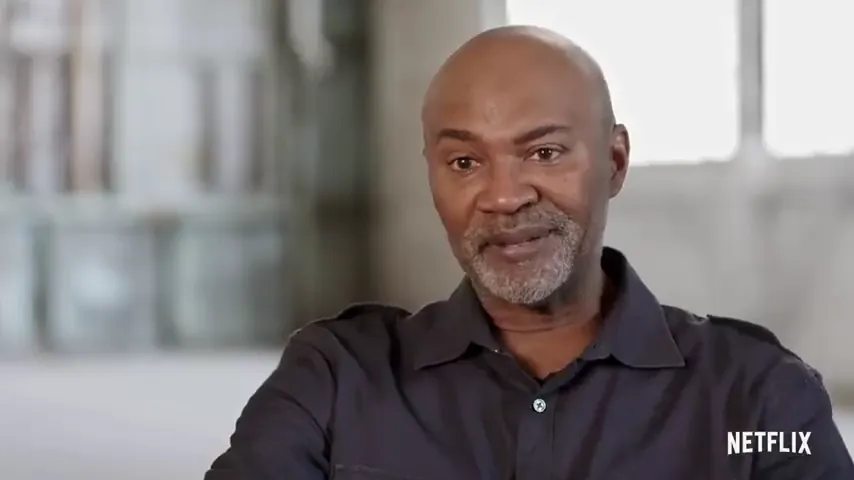
Impact on Communities and Individuals
The film highlights the immense human cost of the epidemic, focusing on the experiences of individuals and families ravaged by addiction and violence. Former users and dealers recount the destructive cycle of dependency and the societal breakdown that occurred. It explores how the crisis overwhelmed healthcare systems, social services, and law enforcement in affected neighborhoods, painting a grim picture of communities struggling to cope.
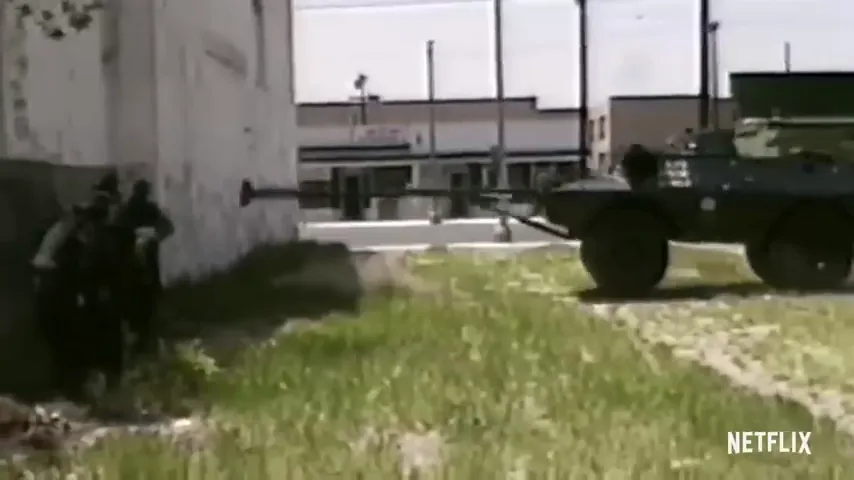
The Government Response: The War on Drugs
The documentary examines the political response to the crisis, particularly the escalation of the ‘War on Drugs’ under the Reagan administration. It details the implementation of harsh sentencing laws, including the significant disparity between penalties for crack cocaine and powder cocaine. The film discusses how these policies led to mass incarceration, disproportionately affecting African American communities, and contributed to the militarization of police forces in urban areas.
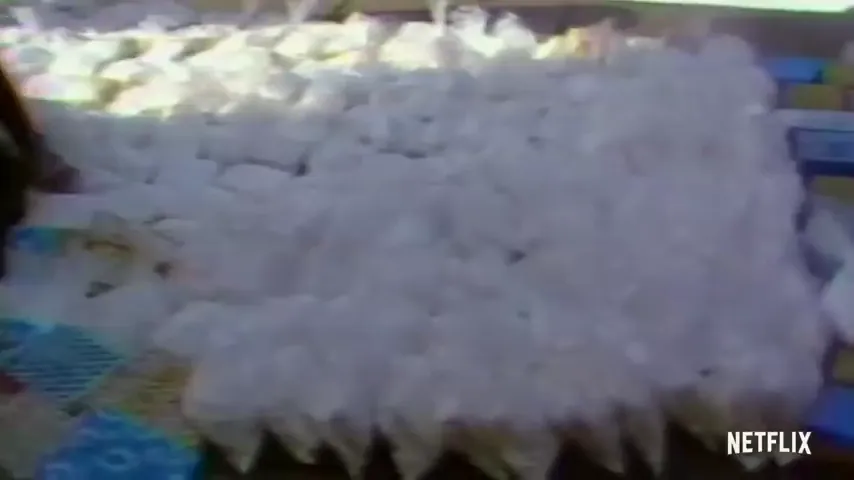
Allegations of Corruption and Conspiracy
A key focus of the film is the exploration of controversial allegations regarding the origins of the crack supply. It delves into claims linking the crack trade in the U.S. to the Iran-Contra affair. The documentary presents arguments and testimony suggesting that elements within the U.S. government were aware of or even complicit in drug trafficking by the Nicaraguan Contras, whose activities were allegedly used to fund efforts against the Sandinista government.
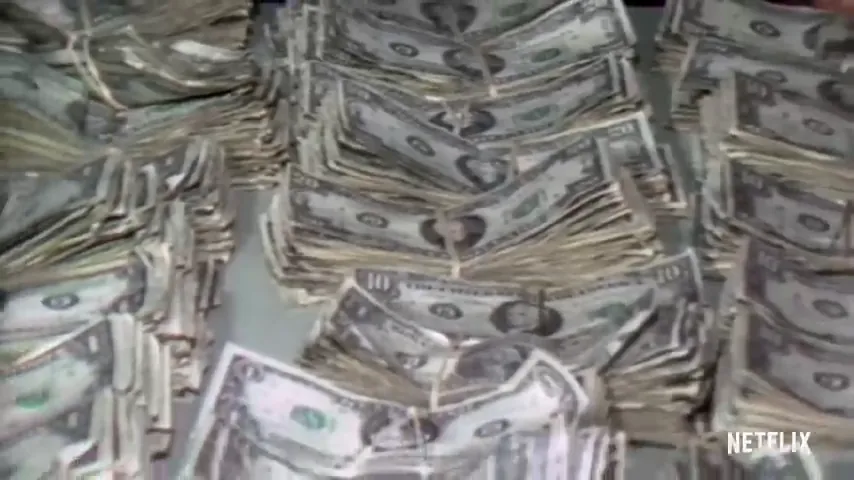
⚠️ Spoilers and Ending Explained
🎬 Cast & Characters
- Richard Stratton (Self): Former smuggler and author who provides insight into the large-scale drug trade fueling the epidemic.
- Michael Levine (Self): Former DEA agent who offers a law enforcement perspective, discussing policy and potential corruption during the era.
- Dr. Carl Hart (Self): Neuroscientist and psychologist who provides expert analysis challenging conventional drug policy narratives.
- Darryl McDaniels (Self): Hip-hop artist from Run-DMC who shares the cultural and community impact of the crack epidemic.
- Dr. Donna Hylton (Self): Activist and former user who recounts the personal devastation and criminal justice system’s impact.
💬 Memorable Quotes
- Nelson George: “Crack was cheap, potent, and readily available. It was the perfect drug for a collapsing economy.” – A journalist explains the socioeconomic factors that made crack cocaine so devastatingly successful and widespread in inner cities.
- Samson Styles: “You had mothers pushing their babies in strollers, going to get high. That wasn’t happening with heroin.” – A former dealer describes the extreme level of addiction and societal breakdown caused by crack, distinguishing its impact from previous drug crises.
- Elizabeth Hinton: “The War on Drugs was framed as a public health crisis, but it was really a war on communities.” – A historian argues that the government’s approach to crack cocaine prioritized criminalization and punishment over treatment and addressing root causes.
- ‘Freeway’ Ricky Ross: “We were just hustling, trying to make a dollar. We didn’t know we were part of something bigger.” – A notorious former dealer reflects on his involvement in the drug trade, suggesting a lack of awareness or context about the wider systemic forces at play.
- Felipe Luciano: “It was like a chemical warfare against black and brown communities.” – An activist expresses the belief that the crack epidemic and the subsequent government response disproportionately targeted and devastated minority populations.
💰Box Office
- Budget: N/A
- Domestic Gross: N/A
- Worldwide Gross: N/A
💥 Crack: Cocaine, Corruption & Conspiracy Reviews
Personal Review
Wow, this documentary really hit me hard. I knew about the crack epidemic from history books and news clips, but hearing directly from people who were there, dealers and users alike, was incredibly powerful. Their stories of survival and devastation are just… raw. It makes you think deeply about how something like this could happen and the layers of issues involved. The film doesn’t shy away from pointing fingers, whether at individual choices, poverty, or even potential government roles, which definitely sparks debate. Seeing the old news footage and comparing the response to crack versus other drug crises was particularly eye-opening. It’s not an easy watch, and it left me feeling pretty angry and sad about a dark chapter in recent history and how it shaped communities for decades.
- Who would enjoy:
- “Fans of historical documentaries”
- “Viewers interested in American social history”
- “Those studying the War on Drugs and criminal justice”
- “People interested in systemic inequality and its causes”
- Content warnings ⚠:
- “Discussions of drug use and addiction”
- “Depictions of violence and crime”
- “Themes of poverty and social injustice”
- “Complex and controversial political topics”
Professional Reviews
- Generated: “Stanley Nelson’s ‘Crack’ is a visceral look at a devastating period in American history. While the archival footage is powerful and the interviews with former dealers and users are heartbreakingly candid, the film struggles to synthesize its various threads. It raises crucial questions about systemic failure and government complicity, but sometimes feels scattered in its focus. A challenging watch that prompts important, if sometimes debatable, discussion.
- Generated: “Nelson delivers a potent, unflinching account of the crack epidemic’s brutal impact on inner cities. The strength lies in the raw testimonies from those who lived through it. The film boldly tackles the complex web of social, economic, and political factors, including controversial claims of government involvement. Though some may find its perspective pointed, it’s an essential, infuriating history lesson that refuses easy answers.
Audience Reactions
Viewers were deeply moved by the personal interviews with individuals affected by the epidemic.: The documentary uses powerful archival footage and provides a historical context often missing from the mainstream narrative.
Many appreciated the film’s willingness to explore controversial topics like alleged government involvement.: The film highlights the devastating impact on Black communities and critiques the ‘War on Drugs’ policies.
Some found the film thought-provoking and felt it exposed uncomfortable truths about race and policy.: It offers valuable insights into the socio-economic factors that contributed to the epidemic.
Conversely, many viewers felt the documentary was heavily biased and pushed a specific political agenda.: Criticisms often centered on the perceived lack of objectivity and focus on blaming external factors rather than individual responsibility.
Overall Consensus: Highly polarizing, the documentary is praised for its powerful interviews and historical context but criticized by many for perceived bias and a one-sided portrayal of complex issues surrounding the crack epidemic.
Awards
🛠️ Behind the Scenes
- “Director Stanley Nelson is a celebrated documentarian known for exploring African American history and experiences, lending a significant perspective to the film’s narrative.”
- “The documentary relies heavily on extensive archival footage from the 1980s and 1990s, capturing the visual and cultural impact of the era and the crack epidemic as it unfolded.”
- “Interviewees include a diverse range of perspectives, from former users and dealers to journalists, historians, and law enforcement, aiming to provide a comprehensive, albeit sometimes conflicting, view of the crisis.”
🖥️ How to Watch Crack: Cocaine, Corruption & Conspiracy?
Crack: Cocaine, Corruption & Conspiracy is available to stream on Netflix. Check your local Netflix library for availability. The documentary may also be available for digital purchase or rental on platforms like Amazon Prime Video, Apple TV, Google Play, or Vudu, depending on your region.
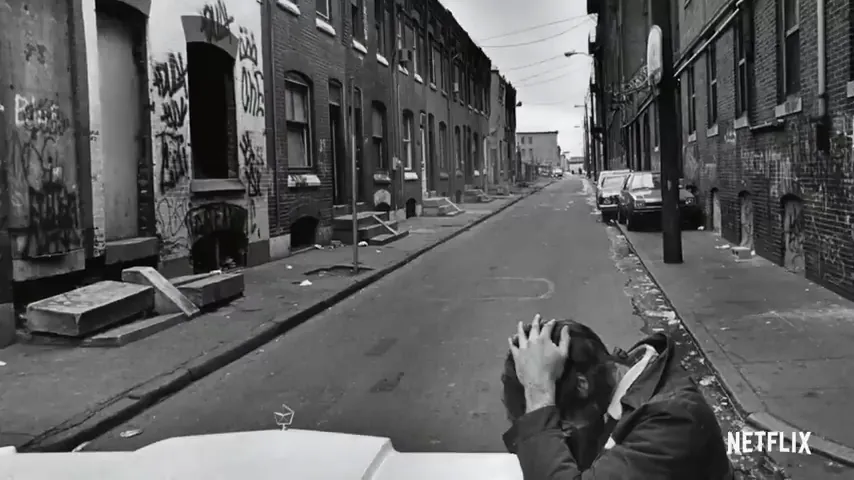
🎥 Similar Movies
If you enjoyed Crack: Cocaine, Corruption & Conspiracy, you might like these similar films:
- The House I Live In (2012): A comprehensive documentary that explores the history and impact of the War on Drugs in the United States, covering similar themes of race, class, and mass incarceration.
- 13th (2016): Explores the intersection of race, justice, and mass incarceration in the United States, arguing that slavery has been perpetuated in the form of criminalization and imprisonment, tying directly into the outcomes discussed in ‘Crack’.
- Paris Is Burning (1990): An era-specific documentary that captures the vibrant but often marginalized urban culture of the 1980s, offering context for the communities most affected by the crack epidemic, though focusing on ballroom culture.
- City of Ghosts (2017): While focused on Syria, this documentary about citizen journalists bravely exposing truth in a dangerous environment mirrors the investigative journalist aspect of ‘Crack’ (like Gary Webb’s story) and the theme of hidden truths and courage.
- Kill the Messenger (2014): A biographical drama (not a documentary) about journalist Gary Webb and his investigation into the CIA’s alleged role in the crack cocaine trade, directly correlating to a key controversial point raised in ‘Crack’. Has gained a cult following among those interested in conspiracy theories and government secrets.
🛒 Crack: Cocaine, Corruption & Conspiracy Related Products
- Dark Alliance: The CIA, the Contras, and the Crack Cocaine Explosion: Investigative journalist Gary Webb’s controversial book exploring alleged links between the CIA-backed Contras and drug trafficking into the US.
- The Wire: The Complete Series: Highly acclaimed HBO series that provides a fictional but realistic portrayal of the drug trade, law enforcement, and urban life in Baltimore, touching on many themes in the documentary.
- The New Jim Crow: Mass Incarceration in the Age of Colorblindness: Michelle Alexander’s groundbreaking book arguing that the U.S. criminal justice system functions as a contemporary caste system.
- Stanley Nelson Film Collection: Other powerful documentaries by Stanley Nelson, known for his focus on African American history and experiences.
🎧 Soundtrack
Crack: Cocaine, Corruption & Conspiracy features a captivating soundtrack that enhances the movie’s atmosphere and emotional impact. Here are some notable tracks:
- “Documentary Score” – performed by Original Composition
- “Period Hits / Archival Music” – performed by Various Artists (reflecting 1980s Hip-Hop, Soul, and Funk)
- “Reflective Themes” – performed by Score
You can find the complete soundtrack on Amazon Music and Apple Music.
🤨 FAQ
The documentary explores the rise of the crack cocaine epidemic in the United States during the 1980s, its devastating impact on inner cities, the government’s response through the War on Drugs, and controversial allegations of government involvement or complicity in the drug trade.
Yes, the film discusses allegations linking the crack cocaine trade to the Iran-Contra affair, exploring claims that drug trafficking by the Nicaraguan Contras was overlooked or facilitated to fund their operations against the Sandinista government, and that this drug supply contributed to the crack epidemic.
The film features interviews with a diverse range of individuals including historians, journalists, former crack users, former dealers, activists, neuroscientists, and former law enforcement officials, offering multiple perspectives on the epidemic and its causes.
Yes, a significant portion of the documentary highlights the severe disparity in sentencing laws between crack cocaine and powder cocaine, arguing that these laws disproportionately targeted and incarcerated individuals in primarily Black communities.
🔥 Bonus Content
Stanley Nelson – Exposing the Crack Epidemic Corruption in Film | The Daily Social Distancing Show
Curious how they tackled such a difficult and important topic? Check out this chat with director Stanley Nelson on The Daily Show; it’s really cool to hear him talk about bringing the story of the crack epidemic and its impact to the screen.
✨ Rate
There are no reviews yet. Be the first one to write one.


